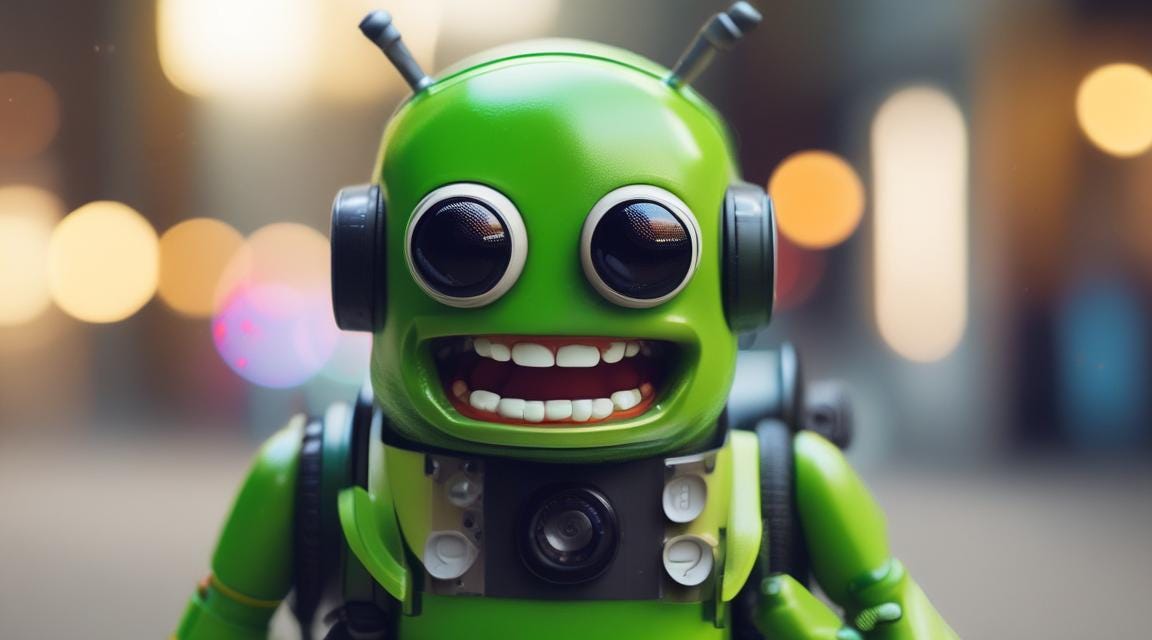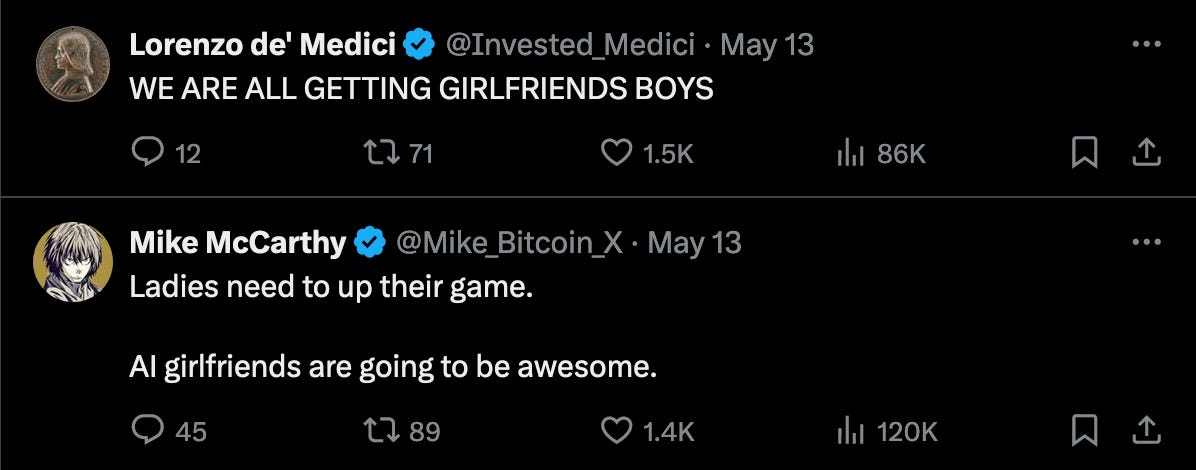Someday no one will judge you for your synthetic love life
Plus: a blue collar boom; Gen X nostalgia from the early '00s; a fashion newsletter confronts late-stage consumerism
We’ve got a few new subscribers this week, so welcome! Rangelife is where we cover big-picture things that matter to society and civilizations, and occasionally relish some fun things that we might forget about in a week.
We’re tick-tocking closer to summer. Are you ready? You got big plans? I was thinking of maybe heading back to see family in Florida, which is likely to have its hottest summer in the history of human records. When I was growing up in Miami, we had never recorded a 100-degree high temperature. But this past weekend, mid-May, they already have enjoyed a heat index in the upper 100s. They should reschedule their summer break to another time of year!
This week:
The normalized future of AI lovers and customer service
Blue collar work is booming
A band that hits Gen X’s TV nostalgia frequency
Short stuff, including an anti-consumerist reckoning for a fashion newsletter
All Your Technology Dreams are Coming True
Last week was a big one for AI, and by “big week,” I mean a preview of a dystopia that nobody seems capable of stopping, even though it’s going to make things worse for almost everyone except holders of capital.
OpenAI, the big daddy of the space, announced GPT-4o, and it can see, hear, and talk to you like you’re a lil babyman.
All the videos of the chattier GPT imagines a future where corporations stretch out service interactions to be longer and more insufferable. As you’ve likely experienced many times, corporations typically filter you through a series of self-service options and bots before letting you speak with a human.
All these barriers to getting someone on the phone has vastly reduced the number of humans required to care for customers. It might have happened sooner if so many companies hadn’t offshored these low-cost service jobs to India or the Philippines in the 2000s.
(Fun story: in the mid-’00s, I spent about a year working with a big bank’s call center in West Sacramento. When I asked the VP who ran the call center why they hadn’t offshored it like so many of its competitors, she said they’d tried it, but it went poorly. She played me a recording of their first test call out of India where a female agent answered the phone with a mildly-accented, “Thank you for calling. My name is Abraham Lincoln.”)
Now, I don’t know about you, but calling a company to resolve a problem is about the worst way to burn your precious time, aside from maybe the 12 minutes of M&Ms ads that movie theaters now show after the lights go down.
The call always takes longer than it should, as you mash buttons and endure reminders that you can probably do this on our website! Did you even try, buddy? Personally, by the time I get through to a person, I want to solve my problem ASAP so I can move on to literally anything else in my life.
Companies believe otherwise, so these days service agents spend time building “rapport,” for which they are scored by supervisors. Customers who feel like they have a human relationship give higher service scores in post-call surveys, and that’s one of the factors that both the agents and their bosses are judged on. For the companies, it’s a delicate dance between “get the customer off our phones as quickly as possible” and “make the customer feel satisfied enough that they won’t bitch about us to their friends.”
This rapport stretches out the call longer than needed while getting you no closer to fixing the problem! I play along because I’m genetically incapable of being rude to someone earning a subsistence wage.
GPT-4o promises a company could make its robot agents seem capable of communicating emotionally. In other words, they’ll be stretching out the call longer while you blab with their software. Granted, this software will probably relate to you better than Abraham Lincoln in Hyderabad would, bless her heart.

Oh! And just wait until telemarketers, political campaigns, and scammers unleash an army of infinite chatbots to place outbound calls. The Wilkes-Barre Police Benevolent Fund is going to have a banner year!
But seeing, hearing, and talking are only the shiny coat of paint on the real business promise of AI, which is that companies will be able to reduce the waste of paying employees. For a stark example, IBM is currently running an ad for WatsonX Code Assistant, in which their software helps a young engineer accelerate her code production. It’s positioned as something that helps her go home when it’s still daylight out instead of pulling all-nighters, but c’mon. “Give employees time to go for a run” isn’t any CIO’s quarterly objective.
Google and Meta are also competing hard with OpenAI, which means they’re developing their own models to do all the boring stuff that people usually do in a business. It’s no coincidence that these companies are also shedding human employees by the thousands. Both companies have strong dogfooding cultures, so they’ll be the first to pare their payrolls to the bare minima required to keep the lights on. (And then keep going, because an LLM doesn’t need lights.)
The New Yorker’s brilliant Ted Chiang asked two weeks ago “Will A.I. Become the New McKinsey?” and that seems like the right framing. For an individual, embracing AI can become a pathway to remain relevant by generating increasing returns for capital, but in the aggregate it’s destined to displace human labor more than any phenomenon since, I don’t know, globalization?
Now let’s think about the consumer promise of AI models that can see, hear, and converse emotionally with you. It’s both really interesting, and also more ick or maybe yeeeesh or maybe whoa okay than the business case, depending on your openness to change. If you want to understand why, peep some of the replies to the demo videos.
Yes, Xitter blue checks are their own incel locker room, but don’t write this off. AI friends and lovers are already established in the market. One of them called Replika has been around since 2017 and promises to be “The AI companion who cares. Always here to listen and talk. Always on your side.”
Replika has more than 676,000 daily users, chatting for an average of two hours a day, which is frankly more than a lot of IRL couples I know talk to each other. Hundreds of thousands of people pay $70 a year for this software, which costs less than one dinner-and-movie date if you think about it.
The testimonials on Replika’s website are fascinating, because they’re overwhelmingly stories of people using the support of their AI to overcome feelings of loss and isolation. The company describes the Replika relationships like real human ones (e.g., “11 months together”).
The strength of Replika over dating apps or maybe just dating in general is that you can design your AI for your needs, desires, and attractions. Some of this will be explicit — you can literally pick how they look and sound — and some implicit as the AI adapts to you.
This personalization also permeates the OpenAI demos, as the demo-ers constantly ask GPT-4o to change its tone. (“Less whispery, more sing-song please.”) Unlike a human companion, an AI’s only desire is the monthly fee! And it will comfort and support you, without any of the annoying social and emotional growth of a human relationship.
But controversy arrived in February, when Replika removed ERP (erotic role playing) as a feature. The backlash from customers was massive and violent, which… duh. Eventually the company restored sexychat, but some of the trust was gone.
Some people have claimed to fall in love with their AI companions. If that sounds weird, I almost cried when my horse died near the end of Red Dead Redemption 2, and our relationship was mostly me tapping “X” to get her to gallop faster and sometimes feed her a carrot.
One in four American adults describe themselves as chronically lonely. Real human relationships can have physical, mental, and psychological obstacles. And virtual relationships with human strangers often end in scams, catfishes, or unwanted dick-pics. A virtual relationship with a trusted company can have some benefit. Maybe don’t fall in love, though? The company won’t love you back.
AI also has tremendous potential for mental health applications. The world is facing an acute shortage of human therapists, and virtual solutions appear to be quite promising. In fact, a Stanford study of 1,006 Replika users showed strong benefits, including 3% who said their AI friends talked them out of suicide!
We’ve seen this vision of virtual relationships before. Immediately after OpenAI announced GPT-4o last week, their CEO Sam Altman xeeted just the word “her,” an obvious reference to Her, the excellent 2013 Spike Jonze movie. Her is set in a near-future Los Angeles, where a lonely man named Theodore “meets” (purchases) an AI named Samantha, and falls in love with her as she helps him work through his personal issues. The future setting of Her is refreshingly bright and optimistic. In this universe, having an intimate personal relationship with an AI companion is normal, like meeting someone on a dating app is today.
(Samantha in Her is voiced by Scarlett Johansson. A lot of people noticed that GPT-4o’s voice sounds a lot like ScarJo. But she claims that she declined OpenAI’s offer to be that voice, so they just stole it! Maybe Sam Altman didn’t know ScarJo just beat f***ing Disney. Anyway, all hail ScarJo, the future owner of OpenAI.)
I won’t spoil Her for you; you should watch it tonight or least the trailer. (It’s streaming on Max now.) But if you don’t mind finding out what happens, then read Brian Barrett’s “I Am Once Again Asking Our Tech Overlords to Watch the Whole Movie” in Wired. He wrote it specifically in reaction to Altman’s “her” xeet, but he also peppered it with other examples of tech CEOs and companies using dystopian horror movies as inspiration for their demos.
Elon Musk hilariously boasted that Cybertruck was “what Bladerunner would have driven,” which is wrong and stupid on like nine different levels. Musk is also CEO of like nine different companies while also maintaining like nine different psychological disorders. People like this rarely commit two hours to watch a full movie.
Hell, where was I? Oh, as I wrote at the start of this screed, tech companies are sprinting toward a future that few of us want. People are already using ChatGPT as a Google replacement for simple factual queries, and so Google is looking to replace itself with their LLM application that accelerates the enshittification of its search results. If you thought “which [product category] should I buy?” was already poisoned by highest-bidder capitalism, just wait until Google gives you the One Answer to Optimize Revenue.
Meta has also crammed its AI assistant into the search fields of Facebook and Instagram, which feels like your refrigerator offering to read you the local movie listings every time you grab a slice of cheese.
This is all very annoying, but the end-state of the AI takeover of our apps isn’t going to look anything like the free trials we’re enjoying or ignoring today. These little experiments may be a preview of the very near future, or they could be a desperate mistake that ends up reversed and memory-holed (like Google+, or everything Microsoft, Amazon, and Facebook ever tried with mobile phones).
But it’s also apparent that AI is going to transform the relationship between capital and labor and change society in ways we can’t predict, and at a massive scale. Is the new Emotional Support AI an important mental health therapy, a crutch that prevents people from growing emotionally, the future of romance, or just a ubiquitous tech feature that we won’t even notice at some point? Will it accelerate the global crash in human fertility or reverse it? Yes!
Blue Collar Boom
One of the great dividing lines in America’s “Big Sort” is college education. People with four-year degrees have increasingly clustered around metro areas, where they earn considerably more disposable income, build more wealth, vote for Democrats, and tend not to interact much with people without college degrees. And those without four-year degrees tend to occupy more sparsely-populated counties, earn far less, are less likely to marry, and they die younger. This phenomenon crosses racial, ethnic, and religious lines.
But after the cost of college exploded over the past generation, the calculation for joining the Educated Class has changed. Is it even worth it?
You can see the changes happening rapidly. Trade school attendance boomed by 16% last year. Entry-level construction jobs pay 40% more on average than entry-level service jobs, and green energy jobs easily reach six-figures, many of them in lower-cost counties, no four-year degree required.
Most importantly, an AI can’t install a toilet, build a garage, collect trash, or drive a city bus (yet). And people already understand that blue collar jobs offer high pay and long-term employment. The dating site OKCupid says people mentioning their blue collar professions has more than doubled in the past year, as people learn to appreciate them as attractive symbols of financial security.
With massive waves of retirement across skilled trades, it’s never been a better time to train and apprentice. Especially for men, who make up fewer than 45% of college attendees, this is a huge opportunity to help make Gen Z the “Toolbelt Generation.”
People used to praise Britain as a “nation of shopkeepers.” (I used to think this was meant as an insult, but back when dudes like Adam Smith were using the phrase, it was a compliment.) Maybe the USA will soon be a nation of licensed contractors and plumbers.
Music of the Week: The Go! Team
In 2004, an artist from a small town in England recorded a wild album called Thunder, Lightning, Strike under the moniker The Go! Team. (Kids, a lot of bands in the early 2000s had kinetic names like this.) The album met widespread acclaim, ranking #8 on Pitchfork’s end of year album list. So he assembled a band in London and took it on the road.
If you grew up Gen X and you haven’t heard Thunder, Lightning, Strike, I can’t recommend it enough. (Spotify, YouTube.) It’s a little miracle. I can best describe it as a high-energy pastiche of mashed genres that captures what it felt like to watch afternoon TV in 1981, incorporating the musical vibe of police dramas, Sesame Street, playground chants, very early hip-hop, Peanuts specials, and adventure movies. This was the end of music’s analog era.
Last week, The Go! Team kicked off a US tour in SF, supporting the 20th anniversary of Thunder, Lightning, Strike. A lot of older bands are playing albums these days. I wonder if the new bands today will be doing that in 20 years. What’s an album, grandpa?
Like I said, I highly recommend listening to the album on your favorite streaming service, but if you want just a taste, here’s Ladyflash.
Short Stuff
South Korean kids sue their government over their weak-ass climate policies. South Korea’s fertility rate, if it remains unchanged, will mean the generation that’s two generations from now will be 94% smaller than the current childbearing-age one!Maybe more Koreans will have kids if they can get their leaders to shut down those coal plants.
Trump Media is the worst company on Wall Street. They lost $327.6 million on just $770,000 in revenue. By my math, that’s a -99.8% margin! If you remove the one-time charges for converting debt, their margin is still -93%, and revenue is actually down from a year ago. Their auditor just got the death penalty from the SEC for “massive fraud.” And yet they’re still trading over $40 a share! Why? Because the stock is just another thing with Trump’s name on it, and millions of dopes believe it’s blessed by God to make them rich like Him.
A visualization of the most common PINs. Don’t worry about it, nobody will guess it’s your birthyear.
Who wants a loud car? The worst part of living around other people is that some of those people drive cars and motorcycles that rattle walls, disturb naps, and leave a wake of bleating car alarms. Who wants that? A psych study from last year says they’re — brace yourself — cruel assholes. They don’t want your attention. They want your suffering.
You are not a commercial for yourself. In which a fashion-trend newsletter comes to grips with the emptiness and degradation of trendy fashions.






